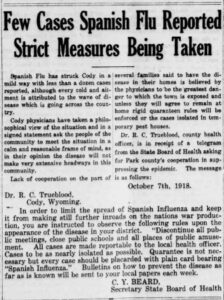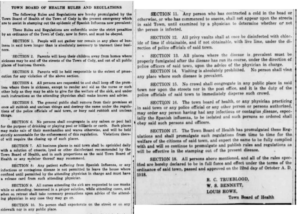1918 Pandemic in Meeteetse and Park County
Part II Rules and Regulations
By Alexandra Deselms, Director of Collections
In the previous post on the 1918 pandemic, we discussed symptoms, personal protective equipment, and medicines through local newspaper accounts. Today, we move on to discuss a related topic: rules and regulations.
About a week after the Meeteetse News first reported an increase in the number of cases in Meeteetse and a general state of anxiety on December 6, 1918, the paper reported that county health officers requested patrons to not congregate in the post office lobby while waiting for mail or at any other time. “At a time like this, when a terrible epidemic is scattering disease broadcast throughout all lands, the populace should ever be on their guard and no effort neglected to ward off its progress. Hence, we know the above request will be readily complied with.” (A request not to congregate together indoors sounds familiar, doesn’t it?)

Article published in the Northern Wyoming Herald on October 9, 1918.
Earlier, an October 10, 1918, article in the Park County Enterprise showed the county health officer taking steps to look after local conditions, as well as a certain amount of judgement by the author against those not following these steps.
At present no public meetings of any kind will be allowed in Cody and it does seem a shame that some people will allow their children to roam the streets. As soon as a case is found the physician of the city placard the house so that all will know of the case[unreadable]. This is not a quarantine, however, and people are abusing the fact. Should you catch a cold, you should at once attempt its cure. Sleeping warmly in a well ventilated room will help and by all means eat good-hearty meals. This is not any thing dangerous if we all take the precautions that we should.
The county health officer was not alone in taking preventative steps or the sole authority on preventative measures. Similar to COVID restrictions today, the county health officers were receiving information from the state health officer and doctors on preventative measures and potential quarantines. In early October 1918, the Northern Wyoming Herald actually reprinted the letter from C.Y. Beard, Secretary State Board of Health to Dr. R.C. Trueblood in Cody:
In order to limit the spread of Spanish Influenza and keep it from making still further inroads on the nations war production, you are instructed to observe the following rules upon the appearance of the disease in your district. ‘Discontinue all public meetings, close public schools and all places of public amusement. All cases are made reportable to the local health officer. Cases to be as nearly isolated as possible. Quarantee [sic] is not necessary but every case should be placarded with plain card bearing “Spanish Influenza.” Bulletins on how to prevent the disease as far as is known will be sent to your local papers each week.’

Town Board Rules and Regulations published in the Northern Wyoming Herald on October 23, 1918.
The three physicians of the Cody Board of Health (R.C. Trueblood, W.S. Bennett, and Louis Howe) assisted the Cody town council with creating an ordinance for “Determining Rules, Regulations, and Orders for the Preservation of the Public Health, to Establish Quarantines, and Enforce Sanitary Conditions Within the Town of Cody,” published on October 23, 1918, in the Northern Wyoming Herald. Before email, the internet, and social media, publishing announcements in the newspaper was one of the easiest, fastest ways to spread information and regulations to the public. These rules were to be obeyed and “enforcible [sic]” under strict penalties. These 18 rules will likely be familiar in message, even if the specifics have changed. They read as follows:
Section 1. People will not gather nor remain in any place of business in said town longer than is absolutely necessary to transact their business.
Section 2. Parents will keep their children away from homes where sickness may be and off the streets of the Town of Cody, and out of all public places of business therein.
Section 3. Parents will be held responsible to the extent of prosecution for any violation of the above section.
Section 4. All persons are requested to and shall keep off the premises where there is sickness, except to render and aid as the nurse or such other help as they may be able to give for the welfare of the sick, and under such instructions as the attending physician shall make known and advise.
Section 5. The general public shall remove from their premises at once all rubbish and unclean things and destroy the same under the regulations of the police officials of said town, or bury said rubbish and unclean things.
Section 6. No persons shall congregate in any saloon or pool hall for the purpose of drinking or playing pool or billiards or cards. Such places may make sale of their merchandise and wares otherwise, and will be held strictly accountable for the enforcement of this regulation. Violations thereof will require the closing up of such places.
Section 7. All business places in said town shall be sprinkled daily with a solution of crosote [sic], Lysol or other disinfectant recommended by the Town Board of Health, and in such proportions as the said Town Board of Health or any member thereof may recommend.
Section 8. Any patient suffering from Spanish Influenza, or any infectious or contagious disease is not permitted to leave the house where confined until permitted by the attending physician in charge and must have a release card from such attending physician.
Section 9. All nurses attending the sick are requested to use masks while so attending, immersed in a proper solution, while attending cases, and when on retreat shall take necessary precautions upon advice of the attending physician in any case they may go on.
Section 10. No person shall expectorate on the street or on any sidewalk nor in any public place.
Section 11. Any person who has contracted a cold in the head or otherwise, or who has commenced to sneeze, shall not appear upon the streets in said Town, until examined by a physician to determine whether or not the person is infected.
Section 12. All privy vaults shall at once be disinfected with chloride of lime if obtainable, and if not obtainable, with live lime, under the direction of police officials of said town.
Section 13. All places where the disease is prevalent must be properly fumigated after the disease has run its course, under the direction of police officers of said town, upon the advice of the physician in charge.
Section 14. Visiting is absolutely prohibited. No person shall visit any place where such disease is prevalent.
Section 15. No crowd shall congregate in any public place in said town nor upon the streets nor in the post office, and it is the duty of the police officials of said town to immediately disperse such crowd.
Section 16. The town board of health, or any physician practicing in said town or any police official or any other person or persons authorized, may order any person having had any infectious or contagius [sic] disease, especially the Spanish influenza, to be isolated and such persons so ordered shall obey said such persons and officers.
Section 17. The Town Board of Health has promulgated these Regulations and shall promulgate such regulations from time to time for the welfare of the citizens of said town, and expect the same to be fully complied with and will so continue to promulgate and publish rules and regulations as will be effective in the stamping out of the present disease.
Section 18. All persons above mentioned, and all of the rules specified are hereby declared to be in full force and effect under the terms of the ordinance of said town, passed and approved on the 22nd day of October A.D. 1918.
What do you think of the similarities or differences in these rules?
Do you have an account of the 1918 pandemic in Meeteetse? Or photos of that time? We’d love to see or hear them!


[…] A public health notice (published interestingly back on page 8) in the Northern Wyoming Herald on January 15 reminded the public that the ban on dances (public and private) was still in effect since dances had proven to be one of the most prolific sources of contagion. Frances M Lane, MD, county health officer, reminded readers that anyone violating the order “would be dealt with according to law,” which could be severe if you remember from the Rules and Regulations post. […]